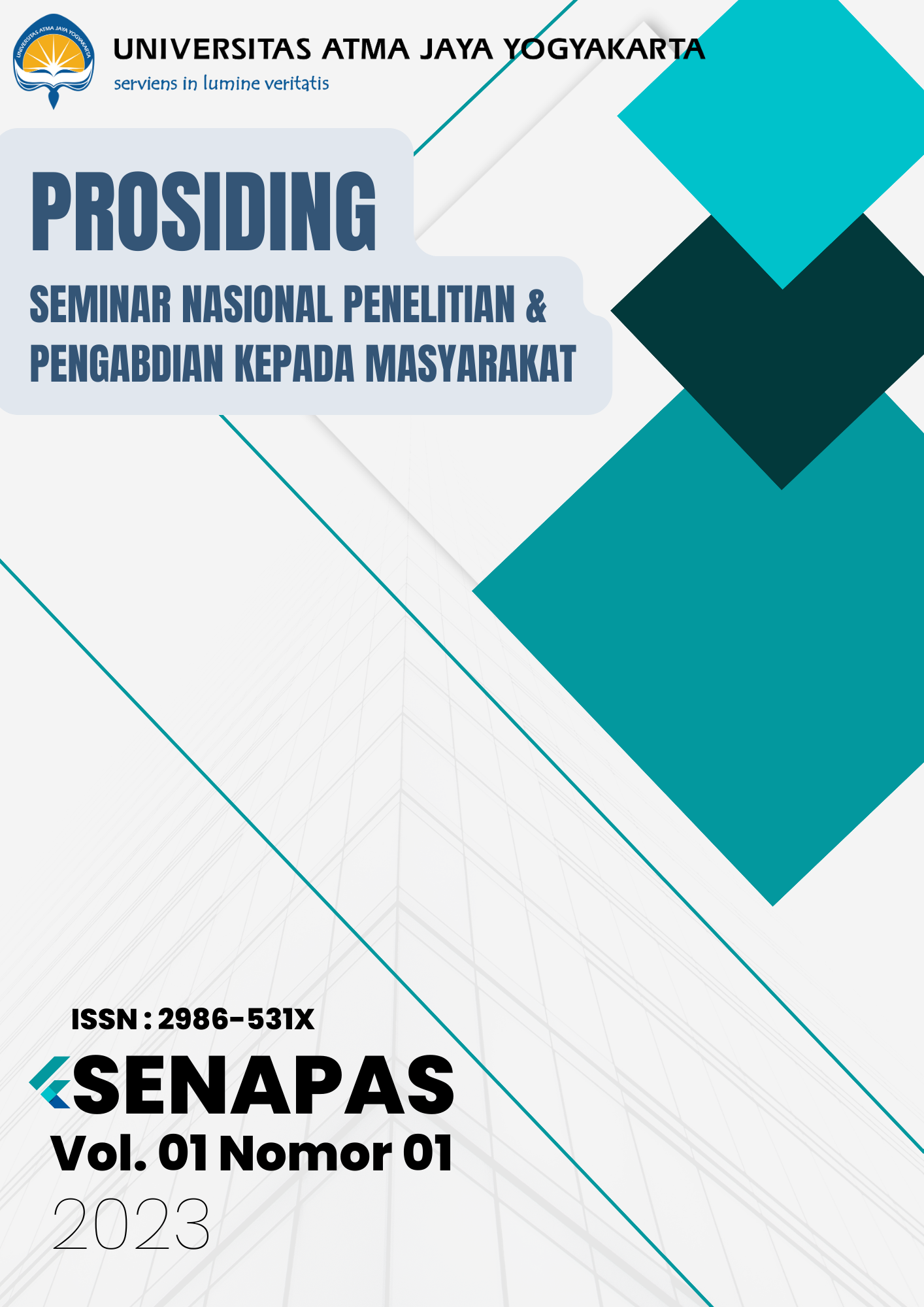Employee’s Organizational Citizenship Behavior Tested from Four Types of Afective Personality
DOI:
https://doi.org/10.24002/senapas.v1i1.7385Keywords:
affective personality, negative affective, positive affective, Organizational Citizenship Behavior, PANASAbstract
Organizational Citizenship Behavior (OCB) has an essential role in the company, such as motivating workers, increasing innovation, and improving company performance. It is important to know what can increase OCB employees. Positive affect and negative affect are orthogonal, and their interaction produces four types of affective personality. This research will discuss the potential of four types of affective personality as a stable measurement guideline to analyze the OCB level of employees in the company.The OCB Scale instrument is used to measure OCB levels. Participants were 159 employees consisting of 101 men and 58 women in agribusiness-company. PANAS Scale is used to measure the positive affect and negative affect of employees. Data will be processed using one-way ANOVA analysis and Post Hoc analysis. The differences of each character from four types of affective personality can be used to be indicators in measuring the level of OCB in a company. This research identifies that there have difference between four types of affective personality on OCB. The tests conducted in this study are self-report so potentially biased answers. Further research needs to be carried out in companies with different characteristics for example in education or banking to increasingly generalize the results of this research.
References
A. Juarez-tarraga and C. Santandreu-mascarell, “What are the main concerns of human resource managers in organizations ?,” Intang. Cap., vol. 15, no. 1, pp. 72–95, 2019.
R. K. Pradhan, L. K. Jena, and I. G. Kumari, “Effect of Work–Life Balance on Organizational Citizenship Behaviour: Role of Organizational Commitment,” Glob. Bus. Rev., vol. 17, pp. 15S-29S, 2016, doi: 10.1177/0972150916631071.
T. M. Glomb, D. P. Bhave, A. G. Miner, and M. Wall, “Doing good, feeling good: Examining the role of organizational citizenship behaviors in changing mood,” Pers. Psychol., vol. 64, no. 1, pp. 191–223, 2011, doi: 10.1111/j.1744-6570.2010.01206.x.
M. W. Becker and M. Leinenger, “Attentional selection is biased toward mood-congruent stimuli,” Emotion, vol. 11, no. 5, pp. 1248–1254, 2011, doi: 10.1037/a0023524.
T. Norlander, S. Å. Bood, and T. Archer, “Performance during stress: Affective personality, age, and regularity of physical exercise,” Soc. Behav. Pers., vol. 30, no. 5, pp. 495–508, 2002, doi: 10.2224/sbp.2002.30.5.495.
N. Ramdhani, D. Ancok, and L. Adrianson, “The Importance of Positive Affect: The Role of Affective Personality in Predicting Organizational Citizenship Behavior,” Makara Hum. Behav. Stud. Asia, vol. 21, no. 2, p. 62, 2017, doi: 10.7454/mssh.v21i2.3501.
S. Somunoglu Ikinci, “A new Perspective: Organizational Citizenship Behaviour and its Reflections,” TEM J., pp. 329–332, 2014, [Online]. Available: http://www.temjournal.com/documents/vol3no4/journals/1/articles/vol3no4/ANewPerspectiveOrganizationalCitizenshipBehaviouranditsReflections.pdf.
D. W. Organ, Organizational citizenship behavior : the good soldier syndrome. Lexington Books, 1988.
M. M. Kumar and S. A. Shah, “Psychometric Properties of Podsakoff ’ s Organizational Citizenship Behaviour Scale in the Asian Context,” Int. J. Indian Psychol., vol. 3, no. 1, pp. 51–60, 2015.
M. Cheung, Z. Peng, and C.-S. Wong, “Supervisor attribution of subordinates’ organizational citizenship behavior motives,” J. Manag. Psychol., vol. 29, pp. 922–937, Nov. 2014, doi: 10.1108/JMP-11-2012-0338.
U. Singh and K. B. L. Srivastava, “Organizational trust and organizational citizenship behaviour,” Glob. Bus. Rev., vol. 17, no. 3, pp. 594–609, 2016, doi: 10.1177/0972150916630804.
I. Knez, D. Hjärpe, and M. Bryngelsson, “Predicting Organizational Citizenship Behavior: The Role of Work-Related Self,” SAGE Open, vol. 9, no. 2, 2019, doi: 10.1177/2158244019854834.
S. An, L. J. Ji, M. Marks, and Z. Zhang, “Two sides of emotion: Exploring positivity and negativity in six basic emotions across cultures,” Front. Psychol., vol. 8, no. APR, pp. 1–14, 2017, doi: 10.3389/fpsyg.2017.00610.
S. Lavy, “Daily Dynamics of Teachers’ Organizational Citizenship Behavior: Social and Emotional Antecedents and Outcomes,” Front. Psychol., vol. 10, no. December, 2019, doi: 10.3389/fpsyg.2019.02863.
P. Vera-Villarroel et al., “Positive and Negative Affect Schedule (PANAS): Psychometric Properties and Discriminative Capacity in Several Chilean Samples,” Eval. Heal. Prof., vol. 42, no. 4, pp. 473–497, 2019, doi: 10.1177/0163278717745344.
K. J. Lloyd, D. Boer, J. W. Keller, and S. Voelpel, “Is My Boss Really Listening to Me? The Impact of Perceived Supervisor Listening on Emotional Exhaustion, Turnover Intention, and Organizational Citizenship Behavior,” J. Bus. Ethics, vol. 130, no. 3, pp. 509–524, 2015, doi: 10.1007/s10551-014-2242-4.
D. Garcia, “The Affective Temperaments: Differences between Adolescents in the Big Five Model and Cloninger’s Psychobiological Model of Personality,” J. Happiness Stud., vol. 13, no. 6, pp. 999–1017, 2012, doi: 10.1007/s10902-011-9303-5.
T. Norlander, Å. Johansson, and S. Å. Bood, “The affective personality: Its relation to quality of sleep, well-being and stress,” Soc. Behav. Pers., vol. 33, no. 7, pp. 709–722, 2005, doi: 10.2224/sbp.2005.33.7.709.
L. Baranik and L. Eby, “Organizational citizenship behaviors and employee depressed mood, burnout, and satisfaction with health and life: The mediating role of positive affect,” Pers. Rev., vol. 45, pp. 626–642, Jun. 2016, doi: 10.1108/PR-03-2014-0066.
A.-K. Samnani, S. Salamon, and P. Singh, “Negative Affect and Counterproductive Workplace Behavior: The Moderating Role of Moral Disengagement and Gender,” J. Bus. Ethics, vol. 119, Jan. 2014, doi: 10.1007/s10551-013-1635-0.
K. Lee and N. J. Allen, “Organizational citizenship behavior and workplace deviance: the role of affect and cognitions.,” J. Appl. Psychol., vol. 87, no. 1, pp. 131–142, 2002, doi: 10.1037/0021-9010.87.1.131.
M. Woerkom and M. C. Meyers, “My Strengths Count! Effects of a Strengths-Based Psychological Climate on Positive Affect and Job Performance,” Hum. Resour. Manage., Sep. 2014, doi: 10.1002/hrm.21623.
R. Dalal, H. Lam, H. Weiss, E. Welch, and C. Hulin, “A within-person approach to work behavior and performance: Concurrent and lagged citizenship-counterproductivity associations, and dynamic relationships with affect and overall job performance,” Acad. Manag. J., vol. 52, no. 5, pp. 1051–1066, 2009, doi: 10.5465/AMJ.2009.44636148.
P. Warr, U. K. Bindl, S. K. Parker, and I. Inceoglu, “Four-quadrant investigation of job-related affects and behaviours,” Eur. J. Work Organ. Psychol., vol. 23, no. 3, pp. 342–363, 2014, doi: 10.1080/1359432X.2012.744449.
P. H. Imer, H. Kabasakal, and A. Dastmalchian, “Personality and contextual antecedents of organizational citizenship behavior: A study of two occupational groups,” J. Manag. Organ., vol. 20, no. 4, pp. 441–462, 2014, doi: 10.1017/jmo.2014.44.
A. M. H. Arbab and M. O. S. Mahdi Abaker, “Human resources management practices and organizational excellence in public orgnizations,” Polish J. Manag. Stud., vol. 18, no. 2, pp. 9–21, 2018, doi: 10.17512/pjms.2018.18.2.01.
C. Martínez-Costa, M. Mas-Machuca, and J. Olivella, “Staffing policies of leading professional service firms,” Intang. Cap., vol. 15, no. 1, pp. 38–56, 2019, doi: 10.3926/ic.1370.
W. B. Schaufeli, “General Engagement: Conceptualization and Measurement with the Utrecht General Engagement Scale (UGES),” J. Well-Being Assess., vol. 1, no. 1–3, pp. 9–24, 2017, doi: 10.1007/s41543-017-0001-x.
Downloads
Published
Issue
Section
License
Copyright (c) 2023 Elisabeth Tatia Pramajati

This work is licensed under a Creative Commons Attribution-ShareAlike 4.0 International License.









